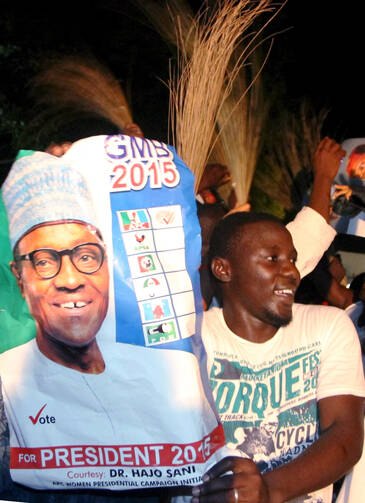Nigerian prelates hailed the country's presidential election as a success for democracy and urged President-elect Muhammadu Buhari to make good governance, security and peace top priorities.
The church leaders also said that while the election was largely peaceful, Nigerians must be patient as the country undergoes a transition in leadership so that Buhari can implement the programs on which he campaigned.
Buhari, 72, a former military dictator with a checkered human-rights record, was declared the winner over President Goodluck Jonathan in polling March 28. The Independent National Electoral Commission announced the final tally March 31.
Buhari's victory marks the first for an opposition party candidate in Nigerian electoral history. Jonathan's party has ruled since decades of military dictatorship ended in 1999.
Archbishop Ignatius Kaigama of Jos, president of the Catholic Bishops' Conference of Nigeria, told Catholic News Service in an email that by their "unprecedented and impressive turnout," Nigerians had defied the violent Boko Haram insurgency "who reject democracy as un-Islamic and who had threatened to kill any Nigerian who cast a ballot."
"Some say, this so far is the most participated election," Archbishop Kaigama said. "Nigeria may have a terrible reputation but offers the rest of the world a lesson: resilience. We manage to smile through our tears and have remained strong, resilient and hopeful. That is not what most outsiders associate with Nigeria -- smiling faces, positive minds and hopeful hearts."
The archbishop said that critics who predicted "the disintegration or destabilization of Nigeria will be surprised to know that irrespective of our multi-dimensional problems, Nigerians still love Nigeria and want to live as one big family."
Bishop Felix Femi Ajakaye of Ekiti credited Nigerians' courage and patience for a peaceful election and called on the country to place the future of the country in God's hands.
"Our politicians must also realize that the votes of Nigerians now count and that this is the time by the government-in-waiting to right the wrongs of the past, to pay evil with good as against evil because we are all Nigerians. If after four years, the incoming administration does not perform up to the expectations of Nigerians, they will surely vote it out," Bishop Ajakaye told CNS.
"They should now know that the era of politics of do-or-die is gone, it is now politics of service to mankind, good governance, truth, honesty," he said.
Bishop John Namaza Niyiring of Kano called Buhari's victory a paradigm shift in Nigerian political history. He expressed hope that the new administration would develop "new ideas with which we will move Nigeria forward."
"We expect the new administration to ... provide security for Nigerians, fight corruption which has become endemic, promote human development, provide employment for the several millions of jobless Nigerians especially the youths," he said.
Bishop Niyiring also challenged Buhari to develop a plan to overcome the Boko Haram insurgency and called on the president-elect to do all it could to locate and release nearly 200 girls abducted from a school in northeastern Nigeria a year ago.
Buhari, he added, "must be there for all Nigerians at all times."
Bishop Stephen Dami Mamza of Yola and Bishop Emmanuel Badejo of Oyo said democracy was served by the election and that they hoped the expected peaceful transition would serve as an example for Africa.
When Buhari takes office May 29, it will mark the second time he has headed the country. He originally rose to power in 1983 in a coup and ruled Nigeria as a military dictator for about 18 months until he was ousted in a counter-coup.
Buhari has pledged to install a government that will end corruption and work to grow the country's economy and overcome the Boko Haram insurgency.








